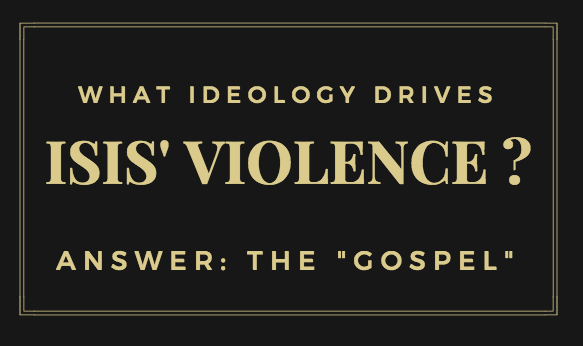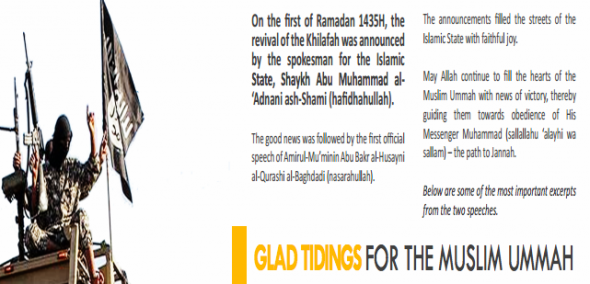The Gospel of ISIS
Why does ISIS terrorize? How ideology drives their violence? The answer is related to the “gospel” ISIS actively proclaims. And frankly, I find their “gospel” interesting. Without condoning or dismissing the violence, I would like to explain their “theology.”
In June 2014, jihadist militants declared an Islamic State in Iraq and Syria. ISIS claims to be a caliphate–an Islamic government establishing God’s rule(s), or God’s “kingdom.” According to ISIS’s glossy propaganda magazine DAQIB (vol 1: pp. 6-9, see image), this announcement of ISIS’s rule was “good news” and “glad tidings.” That is the language of gospel, as you see below.
How is the ISIS caliphate good news? Answer: It restores honor to Muslims.
In the words of ISIS leaders themselves, here is what this gospel means (with honor-shame language underlined):
- “O Muslims everywhere, glad tidings to you and expect good. Raise your head high, for today – by Allah’s grace – you have a state and Khalifah (i.e., kingdom), which will return your dignity, might, rights, and leadership….If kings were to taste this blessing, they would abandon their kingdoms and fight over this grace. So all praise and thanks are due to Allah.”
- “Soon, by Allah’s permission, a day will come when the Muslim will walk everywhere as a master, having honor, being revered, with his head raised high and his dignity preserved. Anyone who dares to offend him will be disciplined, and any hand that reaches out to harm him will be cut off. So let the world know that we are living today in a new era.”
- “The time has come for those generations that were drowning in oceans of disgrace, being nursed on the milk of humiliation, and being ruled by the vilest of all people, after their long slumber in the darkness of neglect – the time has come for them to rise. The time has come for (all Muslims) to wake up from its sleep, remove the garments of dishonor, and shake off the dust of humiliation and disgrace, for the era of lamenting and moaning has gone, and the dawn of honor has emerged anew.”
According to ISIS “the gospel” is this—“God has decisively acted in history to exalt and honor his people.” (To clarify: the deplorable and evil actions of ISIS are completely reprehensible, and only a sliver of all Muslims hold this “theology.”) Yet strangely, biblically literate Christians are in a unique position to understand ISIS’ message and ideology. Did you notice how the language (not ideas!) is strangely “biblical.” And ironically, ISIS’ theology gives us a window into the historical nature of the word euangelion.
For ISIS, the word “gospel” has a public nature, historical setting, and emphasis on glory. Their “gospel” is not a “plan of salvation” or “map to heaven.” Their gospel is “the announcement of Allah’s reign becoming realized through a specific people to restore long-awaited honor.” Here is what I find notable about ISIS’s theology—if you inserted “YHWH” for Allah, it sounds like Isaiah’s definition of “the gospel.”
What is the True, Biblical Meaning of Gospel?
My two-word definition would be: “God reigns!” (cf. Isa 52:7). My longer definition of the gospel would be:
- The sovereign rule of the Creator God,
- which was long-ago promised to Abraham and David,
- and has been inaugurated through the saving death and resurrection
- of Messiah Jesus, the Son of David and Lord of all peoples.
The gospel is about heaven coming to us in history, not just us escaping to heaven. The gospel is about how God saves people through his covenantal promises, not just how we are saved. Make no mistake—there is a personal and ethical dimension to this gospel. God’s reign demands change and loyalty (or to use the standard words, “repentance” and “faith”) from all people, and those people will absolutely spend forever with God. For now, our lives are to bear witness to the current reality of God’s kingdom.
Summary
ISIS has the right “container” (a gospel that is public, corporate, historical, and honor-focused), but the entirely wrong contents (violence, oppression, destruction). On the other hand, evangelicals have the right content (Jesus, humility, faith, cruciformity), but often bend those contents to fit them into a “container” they are not originally designed to fit (a gospel that is strictly individual, private, and other-worldly). Christians must “get the right contents into the right container.” Then, the message of God reigning with his people in glory and honor will sound more like good news to the nations of this world. And this may well summon them to “abandon their kingdoms and fight over this grace.”
I condemn ISIS’ actions as undeniably evil and deplorable. This post is intended as an explanation. I do not endorse or condone militant jihadism, or any other type of violent oppression. See Related Post—ISIS: Terrorizing, or Shaming?



Thanks for this great post! I plan on teaching a class on ISIS this week and these perspectives are very helpful.
Thanks, Ant. For class it may be interesting to read the DAQIB firsthand (just click the link), though it is heavy/intense to look at the face such evil.
Thanks! I watched one of their promotional videos in its entirety last year. My wife left in disgust after five minutes. However, as always, it’s good to hear things from the people themselves.
Great post with some insightful conclusions. The westernized “gospel” can aggravate culturally-induced feelings of isolation and loneliness as it tends to be detached from vibrant community. The Islamic “gospel”, on the other hand, while emphasizing the corporate nature of religion, repels (rightly) outsiders through its use of violent means to propagate its message.
The biblical gospel accomplishes both goals: individual reconciliation to God through the Cross, and corporate restoration to one another through the same. As followers of Christ we have the responsibility to proclaim both by our words and by our deeds.
Thanks Jeff, that is a great point. It makes me think of Eph 2–the whole chapter, not just the first 10 verses. 🙂
Helpful post. The container/content illustration is a great framework. Thanks for posting!
I’ve been debating your article with a good friend and I have major qualms about this. Apart from the fact that this is one of the most Orientalist exercises I’ve seen in a long while (with all the attendant trouble that causes) the last thing we or anyone needs right now is ‘containers,’ ‘frameworks’ or ‘gospels.’ This is precisely what is driving the world to destruction. Why? Because always they degenerate into system-building in which humans become the centre. I don’t mean to be offensive but the response by Muslim scholars to Daesh (please stop pandering to them by using the word ISIS) is debating with them in a non-orientalist way within their own ‘framework’ http://www.huffingtonpost.com/2014/09/24/muslim-scholars-islamic-state_n_5878038.html
However, if you really, really, want to make a comparison to Christianity then a much better one, in my gentle and humble opinion, would be to go back to the Barmen Declaration. We need Karl Barth back: not systems, not frameworks, not containers but the Wholly Other who stands opposed to all human system building.
Richard, point well taken! Though I’m chuckling because several others found the “containers” image rather helpful for putting the pieces together. The aim here was explaining what Westerners find inexplicable, not a theological counter. But I am curious, how would Barth interpret and explain ISIS (and specifically the DAQIB quotes with language of honor, shame, and “gospel”) to the West in a moment of crises?
see shared explanation–very intelligently & understandingly put: http://us2.campaign-archive2.com/?u=47498a2e1ad97dd3d09ae19c5&id=448903aba8